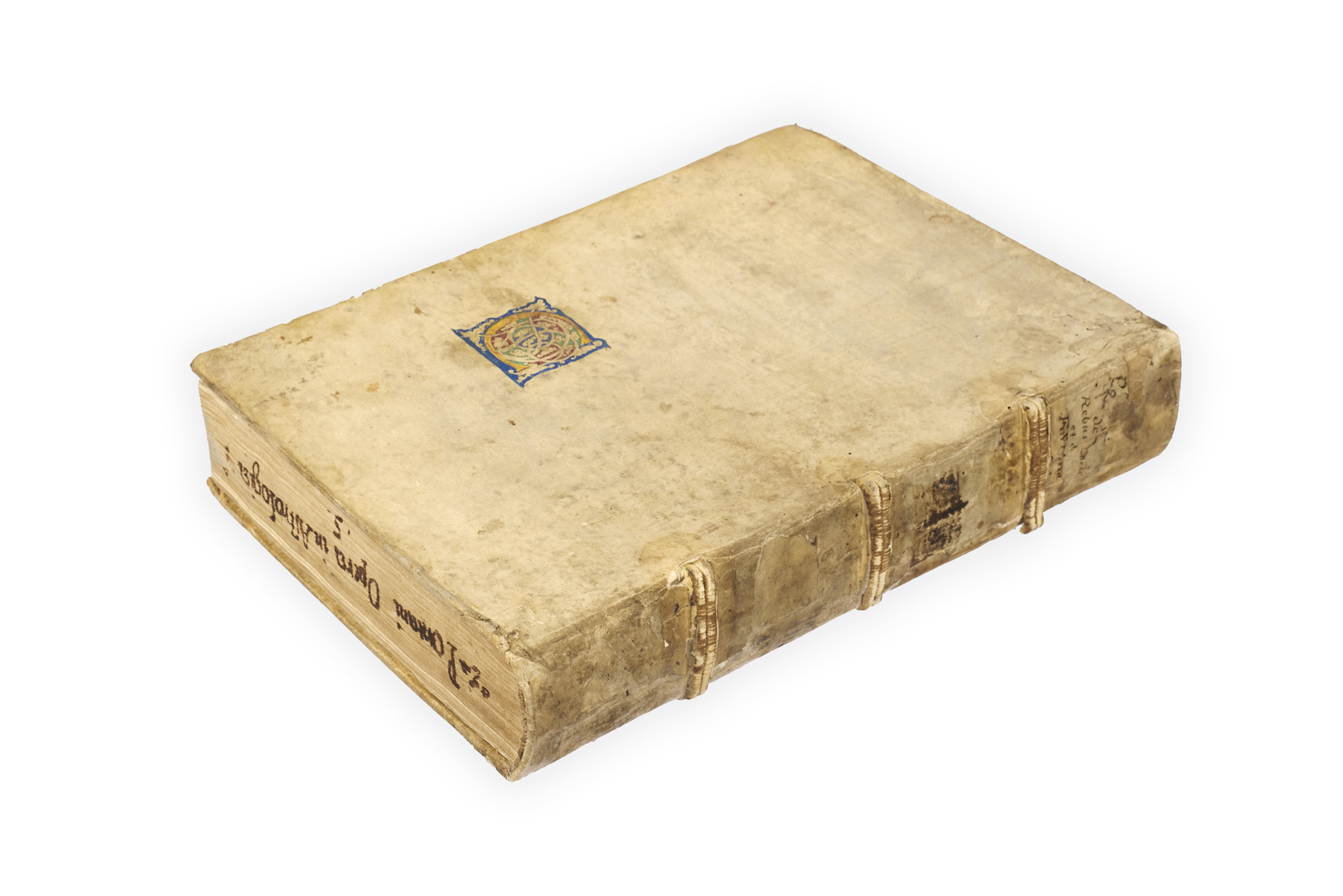
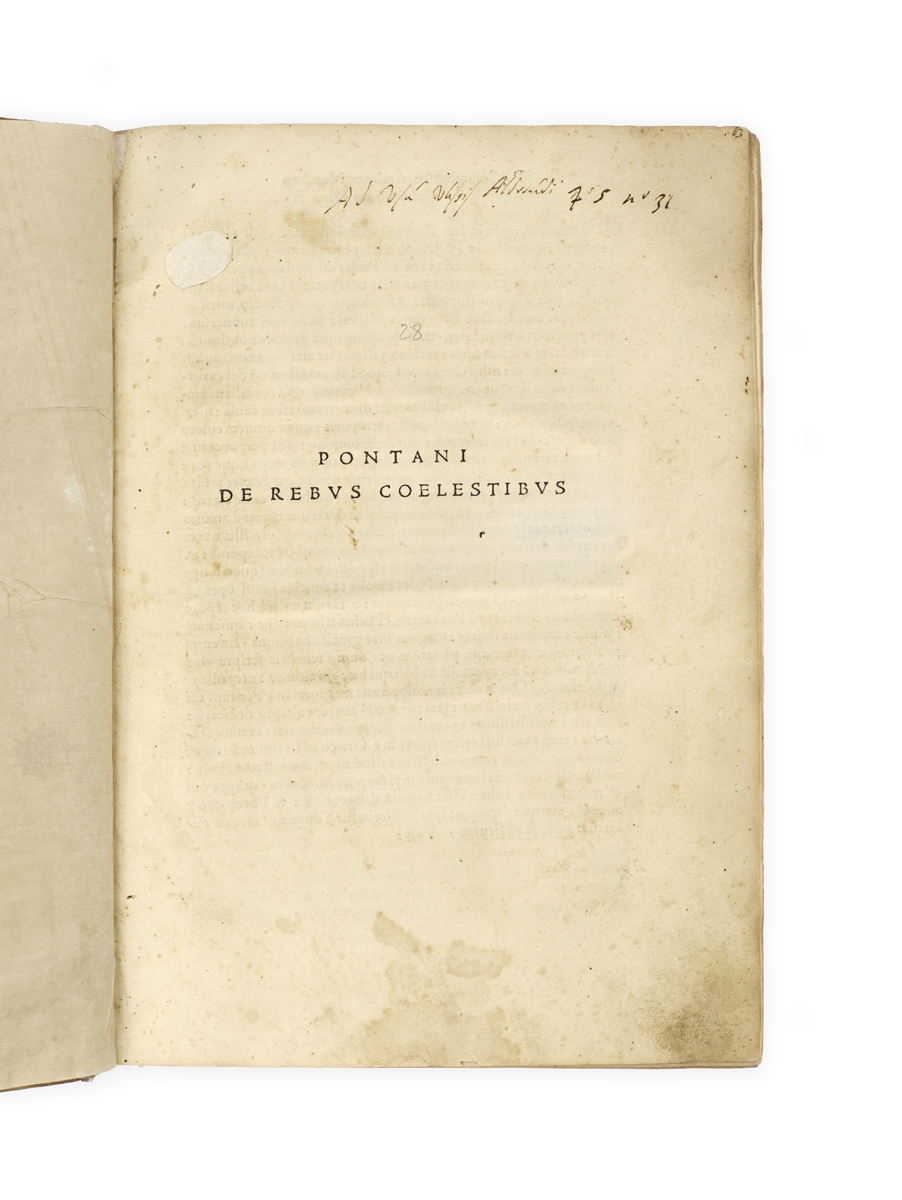
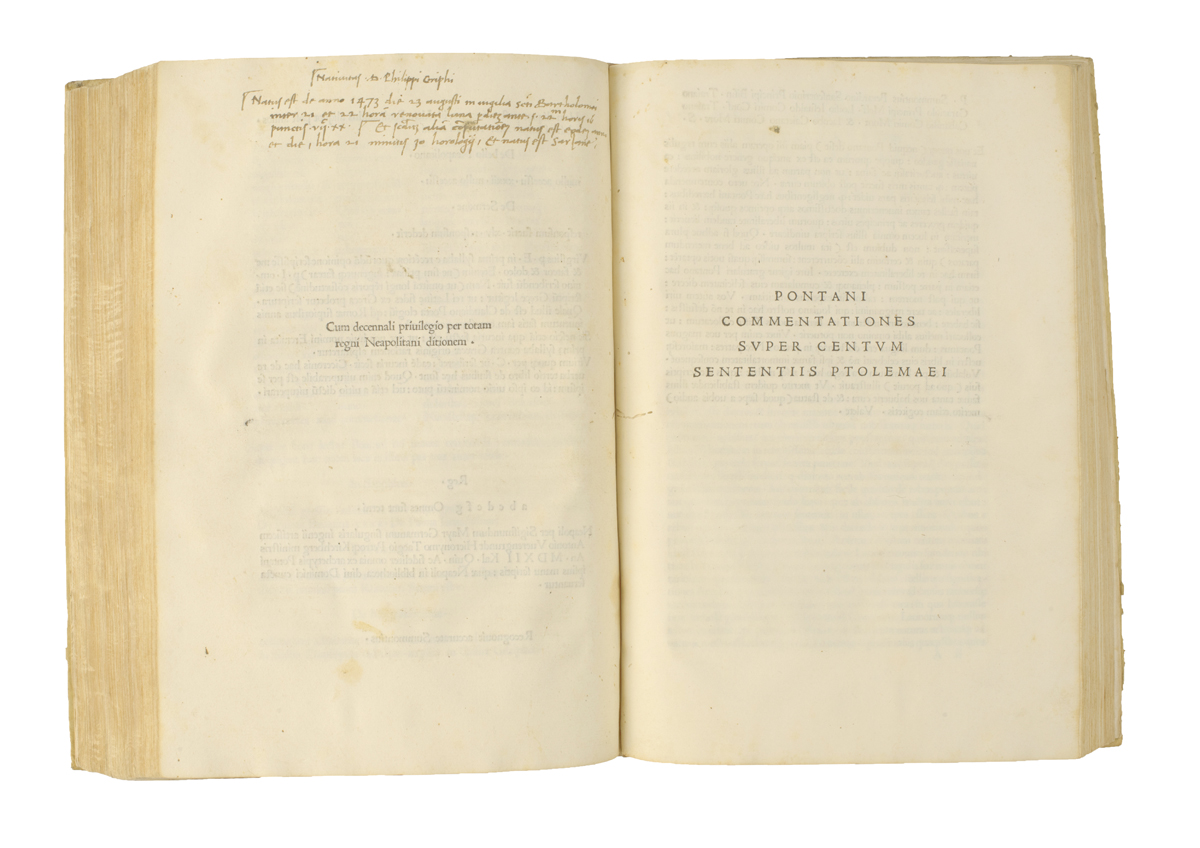
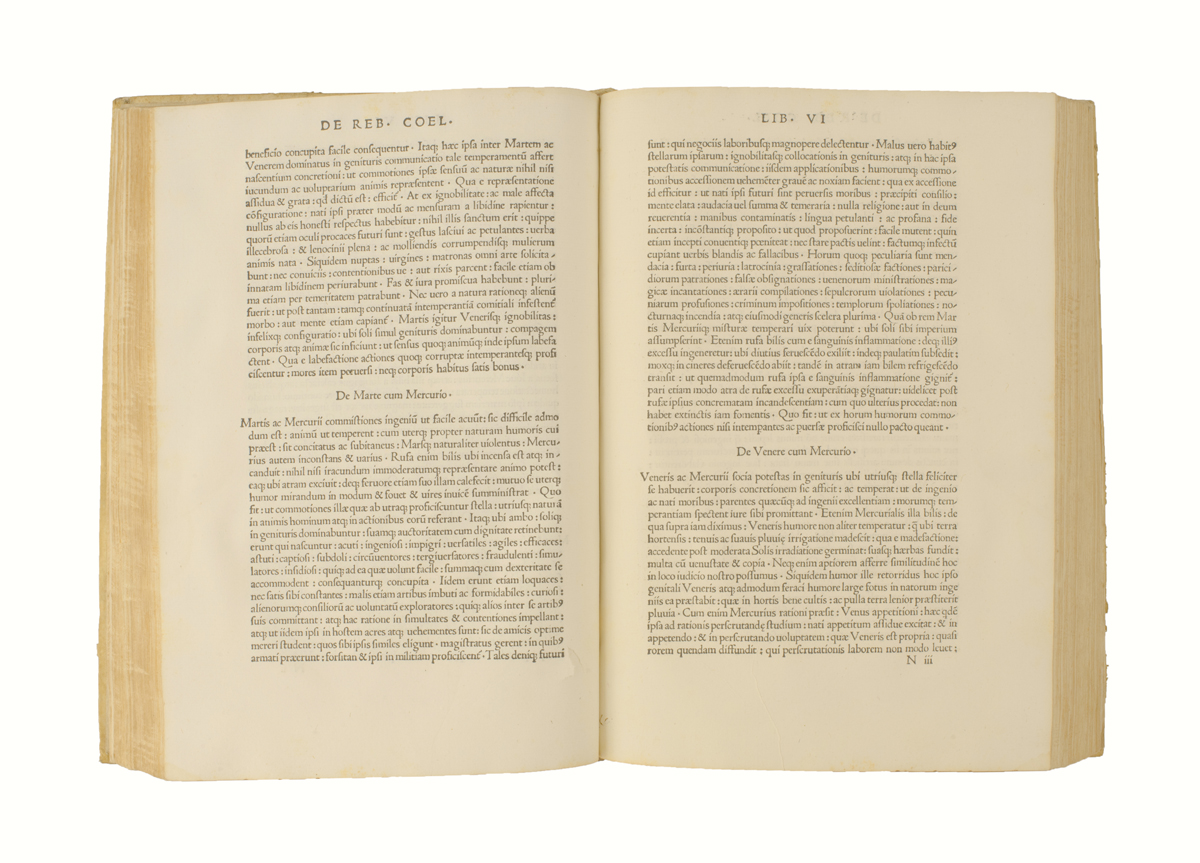
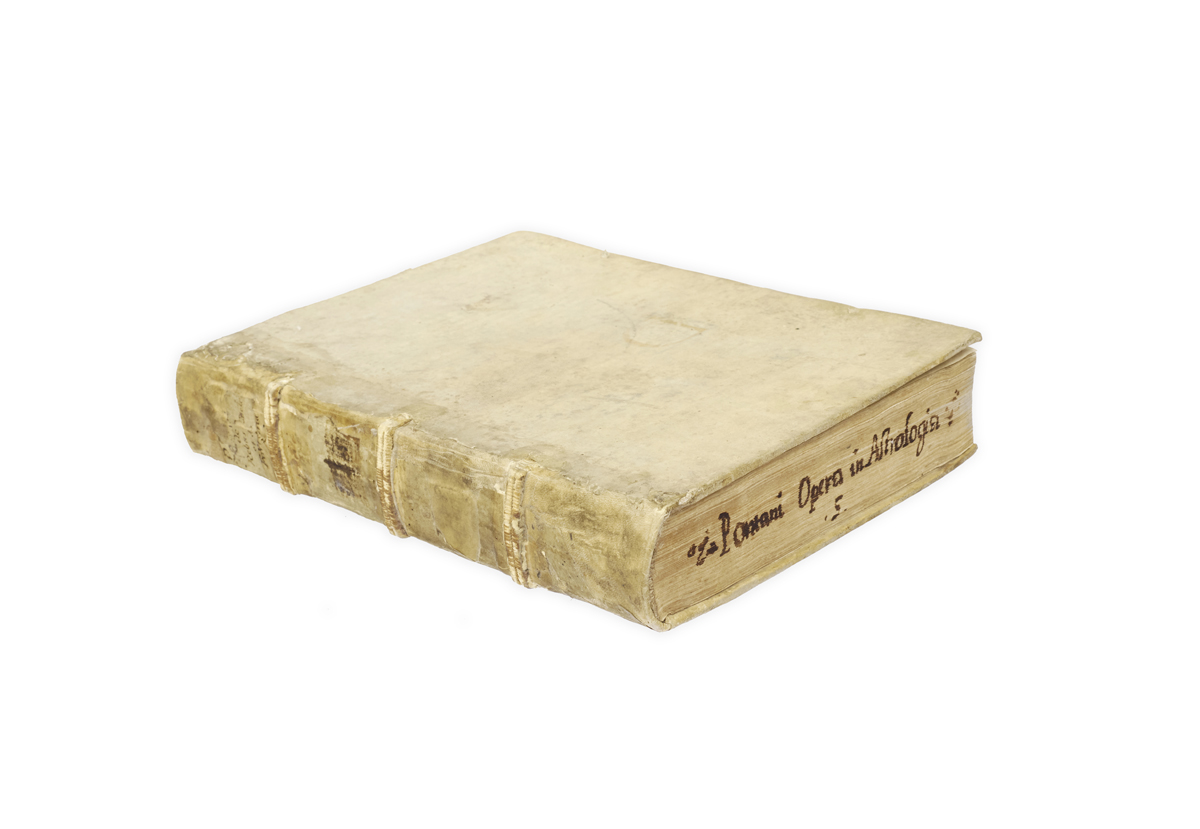
FROM THE LIBRARY OF ULISSE ALDOVRANDI
PONTANO, Giovanni.
De rebus coelestibus.
Naples, ‘ex officina Sigismundi Mayr Germani : summo ingenio artificis Ioannetto Salodio : Antonio Vuerengrundt : Evangelista Papiensi : Petro Kirchberg : & Io. Philippo Nanio ministris’, 1512.
[bound with:]
—. De fortuna. Naples, ‘per Sigismundum Mayr Germanum singularis ingenii artificem : Antonio Vuerengrundt : Hieronymo Taegio : Petroque Kirchberg ministris’, 1 July 1512.
[and:]
—. Commentationes super centum sententiis Ptolemaei. Naples, ‘ex officina Sigismundi Mayr Germani : summo ingenio artificis : Ioannetto Salodio : Hieronymo Taegio & Petro Kirchberg ministris’, 1512.
Three works bound in one vol., folio, ff. De rebus coelestibus: [182], De fortuna: [42], Commentationes: [80]; one small wormhole with old restoration to first two leaves (touching a few characters without loss of sense), the odd spot and a few minute wormholes to inner margins, but overall very good, crisp copies; in a near-contemporary (Bolognese?) binding of vellum manuscript waste over boards (reusing a bifolium from a fifteenth-century Italian (probably Florentine) codex, the outer side with only a fine white vine initial C left unscraped, another initial and original text visible to verso), spine in compartments with 3 exposed split tawed thongs, vestigial ties to fore-edge; some neat restoration to spine, front free endpaper renewed; ownership inscription of Ulisse Aldrovandi to head of first title (‘Ad usu[m] Ulissis Aldrovandi’) with manuscript shelfmark, a single annotation at the end of the second work in a slightly later hand (a hand also found in other books owned by Aldrovandi), author and title in manuscript along lower edges (as in many books from Aldrovandi’s library).
First editions of three works on cosmology, ethics, and astrology by the Neapolitan humanist, poet, and polymath Giovanni Pontano (1426–1503), an important sammelband from the celebrated library of Ulisse Aldrovandi (1522–1605), professor of natural philosophy and natural history at the University of Bologna, and a witness to his most cherished endeavour, the bridging of the gap between collection and classification through a new, observation-based science.
Considered by Linnaeus and Buffon the founder of modern natural history, Ulisse Aldrovandi was among the leading collectors of his day, assembling vast collections of animal, plant, and mineral specimens which formed the nucleus of the first natural history museum open to the public. Aldrovandi was sought out by students, scholars, princes, and cardinals from all over Europe who wished to visit his Wunderkammer, as well as his extensive library, which housed thousands of printed books and a collection of manuscripts. ‘Aldrovandi’s taste in books was extremely varied … The encyclopedic scope of [his] interests makes him a hard individual to classify: he was a university professor charged with teaching philosophy, and as such he had to have a secure command of Aristotle’s works and the commentary tradition (from ancient to contemporary times); yet he was also interested in observation and collecting, was capable of reading Aristotelian and other texts in the original Greek and had deep friendships with humanists working at Bologna’s university’ (Duroselle-Melish & Lines).
The presence of these works by Pontano in Aldrovandi’s library is highly significant: firstly, as Aldrovandi’s own work aimed at integrating and consolidating the knowledge of all processes occurring on Earth, Pontano’s emphasis on the influence of cosmological matters upon earthly phenomena, including biology and pathology, must have supplied an important possible framework. Secondly, Pontano’s methodology aligned closely with Aldrovandi’s: for the Neapolitan polymath, knowledge of astrological phenomena was based on the relationship between established patterns and observation, uniting measurement and calculation with conjectural reasoning.
Even more compellingly, Pontano’s use of biological analogies for the formulation of a theory of the heavens highlighted the potential for a scientific approach which harmonised natural sciences with cosmology. ‘The most notable aspect of Pontano’s astrological treatise is his constant use of analogies drawn from his or “our” terrestrial experience … He likens the relation of the superior determining realm to the inferior determined one to “that between males and females in the very act of the generation of mankind” … Pontano’s analogy of sexuality and reproduction suggests also the close connection of astrology with medicine in the Renaissance. This connection leads him to a further biological analogy, one that is central to his conception of the heavens. The commanding and fostering role of the heart and the flow of the blood in the human and animal organism is used to illuminate the role of the sun in relation to the moon and the other bodies in the heavens, and through them to the earth and its creature’ (Trinkaus, pp. 450–452).
In the second work, an ethical treatise on the relationship between virtue and fortune, Pontano presents a naturalistic, anti-religious, and astrological theory of fortune, stating that fortune depends on the influence of the stars, and is therefore unaffected by the exercise of virtue, before trying to reconcile the influence of the stars with the freedom of will and the action of providence. The third and final work comprises Pontano’s extensive commentary on Ptolemy’s Centiloquium, a standard set text for medical students at the University of Bologna in the fifteenth and sixteenth centuries. It includes, for each proposition, Pontano’s translation of the text from the original Greek.
After his death in 1605, Aldrovandi’s books and museum continued to be housed in his home until around 1617 when, in accordance with his 1603 will, the collections were transferred to the Palazzo Comunale of Bologna (although the reduced number of books in the 1657 inventory suggests that the library may have been subject to some neglect). In May 1742 all the collections were transferred to the newly founded Istituto delle Scienze, but while the manuscripts were kept together, the printed books were dispersed throughout the Istituto’s holdings. Another blow to the collection arrived in 1797 when several books and manuscripts were removed by the Napoleonic commissioners and sent to France. The books and manuscripts that returned after the Restoration were returned to the Istituto’s library (now the Biblioteca Universitaria di Bologna). Some duplicates and other books have since been sold or exchanged and have ‘ended up in local and foreign libraries, while others made their way onto the antiquarian book market, where they still occasionally surface’ (Duroselle-Melish & Lines).
On Aldrovandi’s library, see Duroselle-Melish & Lines, ‘The Library of Ulisse Aldrovandi (†1605): Acquiring and Organizing Books in Sixteenth-Century Bologna’ in The Library (June 2015), pp. 133–161; see also Bacchi, ‘Ulisse Aldrovandi e i suoi libri’ in Archiginnasio (2005), pp. 255–365; and Tavoni, ‘Nel laboratorio di Ulisse Aldrovandi: un indice manoscritto e segni di lettura in un volume a stampa’ in Le paratexte 6 (2010). On Pontano, see Trinkaus, ‘The Astrological Cosmos and Rhetorical Culture of Giovanni Gioviano Pontano’ in Renaissance Quarterly 38, no. 3 (1985), pp. 446–472.